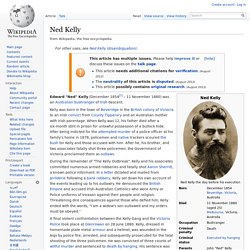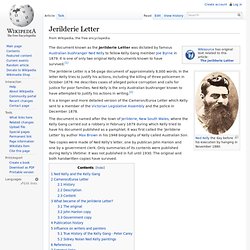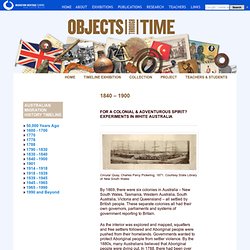

Ned Kelly. Edward "Ned" Kelly (December 1854[1] – 11 November 1880) was an Australian bushranger of Irish descent.

Kelly was born in the town of Beveridge in the British colony of Victoria to an Irish convict from County Tipperary and an Australian mother with Irish parentage. When Kelly was 12, his father died after a six-month stint in prison for unlawful possession of a bullock hide. After being indicted for the attempted murder of a police officer at his family's home in 1878, policemen and native trackers scoured the bush for Kelly and those accused with him. After he, his brother, and two associates fatally shot three policemen, the Government of Victoria proclaimed them as outlaws.
During the remainder of "The Kelly Outbreak", Kelly and his associates committed numerous armed robberies and fatally shot Aaron Sherritt, a known police informant. A final violent confrontation between the Kelly Gang and the Victoria Police took place at Glenrowan on 28 June 1880. Family background and early life. Everyday life. In 19th century Melbourne free land was scarce, housing was a problem, and when times got tough, people turned to alcohol. Those who watched the city grow tell the story of how the streets were named, when the first brewery appeared, and how a woman got by in a man's world.
The witty observations of an Irish journalist tell the real story of life in Port Phillip. Hard times and economic woes made the lure of alcohol all too tempting for Melbourne's common folk. After some initial problems, Melbourne's city grid became an iconic feature of a rapidly growing town. Melbourne's population in the 1800s reflected the city's growth as a bustling metropolis. Melbourne's city street names link directly to the story of colonial life in Port Phillip. Almost since their arrival, settlers had felt strongly that Port Phillip deserved to be a separate colony. Female convicts and free settlers were a small but important part of Port Phillip's development. Golden Victoria. Jerilderie Letter. The document known as the Jerilderie Letter was dictated by famous Australian bushranger Ned Kelly to fellow Kelly Gang member Joe Byrne in 1879.

It is one of only two original Kelly documents known to have survived.[1] Ned Kelly the day before his execution by hanging in November 1880. The Jerilderie Letter is a 56-page document of approximately 8,000 words. In the letter Kelly tries to justify his actions, including the killing of three policemen in October 1878. He describes cases of alleged police corruption and calls for justice for poor families. It is a longer and more detailed version of the Cameron/Euroa Letter which Kelly sent to a member of the Victorian Legislative Assembly and the police in December 1878. Two copies were made of Ned Kelly's letter, one by publican John Hanlon and one by a government clerk. Ned Kelly and the Kelly Gang[edit] Cameron/Euroa Letter[edit] History[edit] Description[edit] The Jerilderie Letter is 56 pages long and contains approximately 8000 words.
Australia's migration history timeline. Circular Quay, Charles Percy Pickering, 1871.

Courtesy State Library of New South Wales By 1869, there were six colonies in Australia – New South Wales, Tasmania, Western Australia, South Australia, Victoria and Queensland – all settled by British people. These separate colonies all had their own governors, parliaments and systems of government reporting to Britain. As the interior was explored and mapped, squatters and free settlers followed and Aboriginal people were pushed from their homelands. Governments wanted to protect Aboriginal people from settler violence. The discovery of gold sent a shock wave through Colonial Australia. Chinese in Lambing Flat riots, December, 1860. Chinamen at work on the gold fields. Immigrant ships brought thousands of people keen to try their luck at the diggings.
The Chinese diggers moved from goldfield to goldfield within New South Wales and across the border. Samuel Sweet, Overland telegraph party, J.A.G.